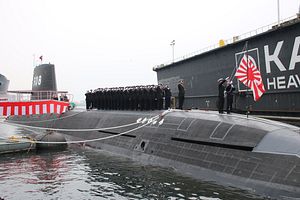The Indian Navy has issued a request-for-information to six overseas manufacturers for an eventual $8 billion contract to build six advanced submarines with air-independent propulsion (AIP) technology under the Project 75(I) initiative.
“The Indian Navy has issued an RFI asking competent companies that have independently designed and constructed a modern submarine, which is either currently in service or is undergoing sea trials,” Indian officials told the Hindu.
The final shortlist of six manufacturers to have received the RFI includes ThyssenKrupp Marine Systems (Germany), Naval Group (France), Navantia (Spain), Saab (Sweden), Rubin Design Bureau-Amur Shipyard (Russia and Italy), Mitsubishi Heavy Industries and Kawasaki Heavy Industries (Japan).
The confirmation that Japan’s Mitsubishi-Kawasaki consortium has received an RFI from the Indian Navy is a significant development, if true. As the Diplomat discussed in early 2015, the Indian government had floated a proposal with the Japanese government to this effect more than two years ago. The move came shortly after Japan lifted its decades-long self-imposed ban on weapons exports.
The Soryu-class submarines built by Mitsubishi and Kawasaki are among the most advanced AIP-equipped diesel-electric submarines. Moreover, inviting Japanese firms to participate in the RFI for the Project 75(I) tender could benefit the broader strategic relationship between India and Japan, which grows closer every year.
However, Japan and India have long been bogged down in pricing negotiations over the sale of ShinMaywa US-2 amphibious aircraft. The pending deal, once completed, would be Japan’s most significant overseas defense-related sale since the lifting of the self-imposed ban on exports.
For Mitsubishi and Kawasaki, competing for the Indian Project 75(I) will offer an opportunity to move forward after losing Australia’s SEA-1000 contract to France’s DCNS. The Australian government ultimately chose the Shortfin Barracuda design for its Collins-class replacement, dealing a disappointing defeat to Japanese Prime Minister Shinzo Abe’s government, which had hoped to see its first major overseas arms sale.
However, the Soryu, while an impressive submarine, appears to be the odd one out of likely offerings from the other five manufacturers. In particular, with a submerged displacement in excess of 4,200 tons, the Soryu is much larger than other offerings ranging from TKMS’ Type 214 (1,860 tons) to Rubin’s advanced Amur-class (1,100 tons).
The second-largest design would be Naviantia’s S-80 Plus-class submarine, which has a total submerged displacement of 2,426 tons. Mitsubishi and Kawasaki last built a sub-3,000 ton diesel-electric submarine in the 1990s, the Harushio-class.
Beyond its technical specifications, a Japanese submarine would be a new addition to the Indian Navy’s repertoire, potentially creating longer term maintenance and logistics challenges.
India already operates German Type 209 (Shishumar-class) submarines, Russian Kilo-class (Sindhughosh-class), and French Scorpene-class (Kalvari-class) submarines; moreover, two of the German-designed submarines, INS Shalki and INS Shankul, were made in India under a technology transfer agreement.
Despite this mismatch between the Soryu and the other five manufacturer offerings, the Japanese firms may see an edge if they see government backing on technology transfer to India.
According to the Hindu, the Project 75(I) RFI will require manufacturers to demonstrate that they could build these six submarines with a partner in India under Indian Prime Minister Narendra Modi’s ‘Make in India’ initiative.
Despite the difficulties that New Delhi and Tokyo have seen in concluding the US-2 sale, the Abe government may enthusiastically support the Mitsubishi-Kawasaki bid for the Indian Project 75(I) contract.

































